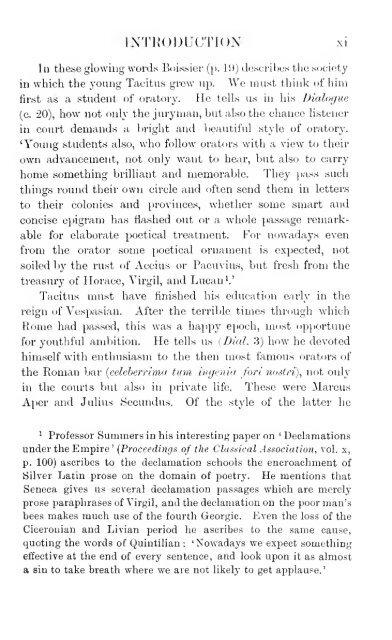Create successful ePaper yourself
Turn your PDF publications into a flip-book with our unique Google optimized e-Paper software.
INTRODUCTION xi<br />
In these glowing words Bois.sier (p. 19) describes the society<br />
in which the young <strong>Tacitus</strong> grew up. We must think <strong>of</strong> him<br />
first as a student <strong>of</strong> oratory. He tells us in his Dialogue<br />
(c. 20), how not only the juryman, but also the chance listener<br />
in court demands a bright and V)eautiful style <strong>of</strong> oratory.<br />
'Young students also, who follow orators with a view to their<br />
own advancement, not only want to hear, but also to carry<br />
home something brilliant and memorable. <strong>The</strong>y pass such<br />
things round their own circle and <strong>of</strong>ten send them in letters<br />
to their colonies and provinces, whether some smart and<br />
concise epigram has flashed out or a whole passage remark-<br />
able for elaborate poetical treatment. For nowadays even<br />
from the orator some poetical ornament is expected, not<br />
soiled by the rust <strong>of</strong> Accius or Pacuvius, but fresh from the<br />
treasury <strong>of</strong> Horace, Virgil, and Lucan *.'<br />
<strong>Tacitus</strong> must have finished his education early in the<br />
reign <strong>of</strong> Vespasian. After the terrible times through which<br />
Rome had passed, this was a ha^jpy epoch, most op^jortune<br />
for youthful ambition. He tells us {Dial. 3) how he devoted<br />
himself with enthusiasm to the then most famous orators <strong>of</strong><br />
the Roman bar {celeherrima turn ingenia fori nostri), not only<br />
in the courts but also in private life. <strong>The</strong>se were Marcus<br />
Aper and Julius Secundus. Of the style <strong>of</strong> the latter he<br />
1 Pr<strong>of</strong>essor Summers in his interesting paper on ' Declamations<br />
' under the Empire (Proceedings <strong>of</strong> the Classical Association, vol. x,<br />
p. 100) ascribes to the declamation schools the encroachment <strong>of</strong><br />
Silver Latin prose on the domain <strong>of</strong> poetry. He mentions that<br />
Seneca gives us several declamation passages which are merely<br />
prose paraphrases <strong>of</strong> Virgil, and the declamation on the poor man's<br />
bees makes much use <strong>of</strong> the fourth Georgic. Even the loss <strong>of</strong> the<br />
Ciceronian and Livian period he ascribes to the same cause,<br />
quoting the words <strong>of</strong> Quintilian : 'Nowadays we expect something<br />
effective at the end <strong>of</strong> every sentence, and look upon it as almost<br />
a sin to take breath where we are not likely to get applause.'

















